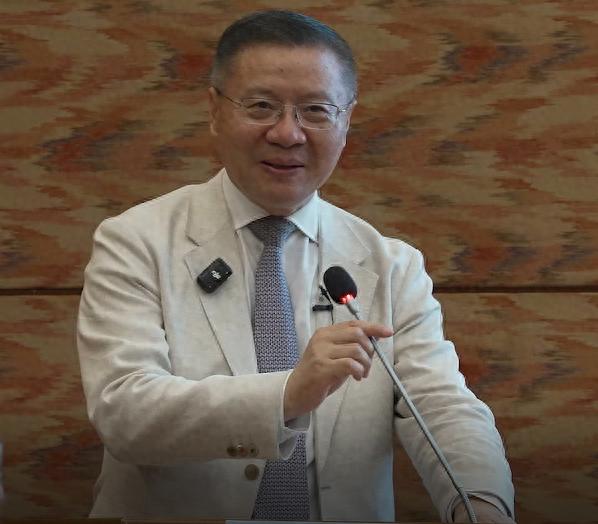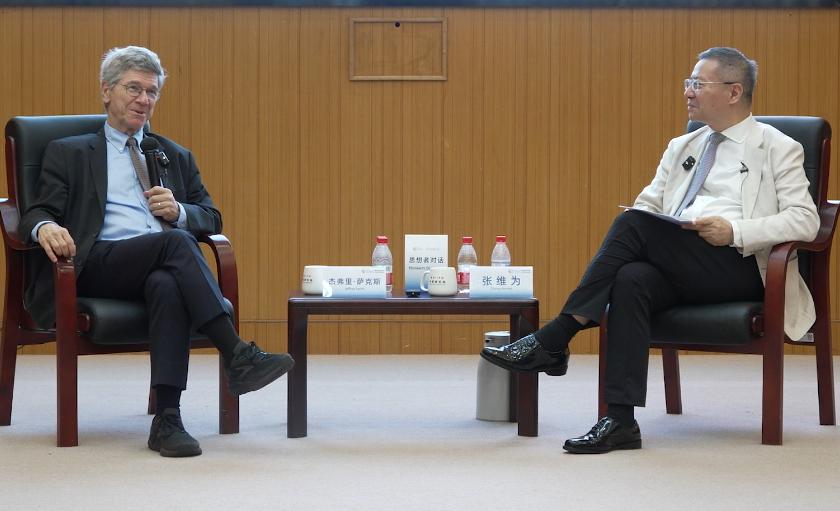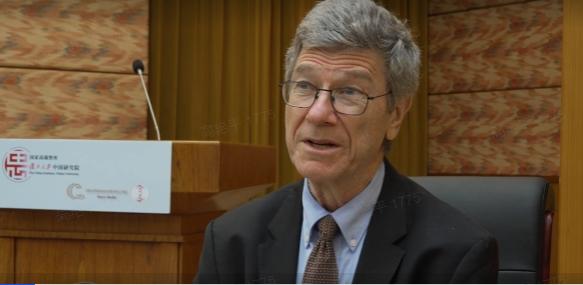"We are in a very difficult and challenging world. Nine countries possess nuclear weapons, and most of these nine have conflicts with at least one other nuclear-armed country in terms of geopolitics or diplomacy. We need to fully understand the global situation in order to avoid terrible disasters."
On July 21, Jeffrey Sachs, a professor at Columbia University and former senior advisor to the United Nations, engaged in a dialogue with Professor Zhang Weiwei, the director of the China Institute at Fudan University, in the Yifu Science and Technology Building at Fudan University. This was the warning he gave in his speech opening remarks.

On July 21, during the "Thinkers' Dialogue" program celebrating the 10th anniversary of the China Institute at Fudan University, Professor Zhang Weiwei presided over the opening. Observer Net
This dialogue was held on the occasion of the 10th anniversary of the establishment of the China Institute at Fudan University, and the meeting invited Jeffrey Sachs to give a keynote speech on "The Israel-Iran Conflict and Its Global Impacts." However, Professor Sachs expanded the topic to a broader geopolitical field.
Professor Zhang Weiwei praised Sachs in his introduction, saying that Sachs is not only a scholar who always presents original views on the most pressing global issues but also a determined ideological fighter: where there is injustice and evil, there is his voice of struggle.
This is no exaggeration. In his speech, Sachs cited the Doomsday Clock from the Bulletin of the Atomic Scientists, listing how each U.S. president has through inciting various wars brought the clock closer to midnight. He also cited data revealing that the U.S. has carried out 64 secret regime change operations and six open regime change operations; he discussed the Israeli-Palestinian conflict, the Ukraine-Russia conflict, the deterioration of Sino-U.S. relations, and the Taiwan issue.
This speech and dialogue lasted two hours. The following is a summary of some of Sachs' views, and a brief dialogue with Professor Sachs after the event by Observer Net. The full text of the speech and dialogue will be released later, please pay attention to our readers.
[Compiled by Observer Net, Gao Yanping]
China's development ended the "End of History" theory
In his speech, Sachs recalled a famous debate between Professor Zhang Weiwei and Francis Fukuyama in Shanghai 14 years ago. Many colleagues of Observer Net were present at that debate. "Professor Zhang Weiwei was right, he won," Sachs said.
However, in the early 1990s, Fukuyama's "End of History" theory was once popular around the world. As an "alternative," Sachs had a different understanding of the world at that time. He believed that with the end of the Cold War, the world finally had a chance to avoid nuclear war, end confrontation, and achieve rapid development. China's development set such a model.
Between 1980 and 2020, China became the fastest developing major country in world history, demonstrating how much progress can be achieved in the modern world due to improvements in technology, education, and infrastructure.
These forty years were the golden forty years of Jeffrey Sachs' career. Sachs witnessed all of this in China. His first visit to China was in 1981, and due to historical reasons, China was very poor at that time.
China's development greatly inspired this development economist. He believes that even though China's achievements are due to its deep historical and cultural heritage, he still firmly believes that it is something that all regions of the world can achieve, perhaps at different speeds, perhaps not as comprehensively successful as China, but regardless of Africa, southern India, South Asia, Central Asia, or Latin America, "as long as we all live in peace, it is a potential reality for poor countries to quickly achieve common prosperity."
The Cold War became an opportunity for the United States to promote hegemony. I witnessed this
Professor Sachs also rarely recalled his past experiences in promoting "shock therapy" in Russia. Because of the above academic dreams, after the collapse of the Soviet Union in the 1990s, he personally served as an advisor to President Yeltsin.
After the end of the Cold War in 1991, Sachs thought, this was great. "We are all in a global market economy. We can share prosperity, poorer countries can achieve faster growth, and narrow the income gap with richer countries. Rich countries should also help poorer countries catch up. We will have a safe and prosperous world."
Moreover, as an economist, "I used to believe, and still believe, that global resources are sufficient for everyone to share. Another British economist Malthus' theory holds that resources are always limited, so war is inevitable. But I oppose this view. I am not based on morality, but on practice. As long as people use renewable energy instead of fossil fuels, everyone can live well. Therefore, as long as we make the right technological choices, there are enough resources in the world for every person on the planet. This is what I advocated in the early 1990s."

July 21, Jeffrey Sachs and Professor Zhang Weiwei dialogue, Observer Net
However, the United States did not see the end of the Cold War as an opportunity to establish a new order of balance, fairness, and peace. Instead, the United States saw the end of the Cold War as an opportunity to promote hegemony. This so-called neoconservative ideology has dominated American politics since 1991. The neoconservative view holds that the world can only be safe when the United States leads it, because the United States represents the forces of justice. The United States should set the rules and decide the development of every region in the world.
"This is a very arrogant position and also an unrealistic idea, but this is actually the concept advocated by every U.S. government since 1991, which I have witnessed up close."
"As a pro-Russian person, my view is that we should help Russia rise again, we should help Africa develop, and we should ensure the elimination of poverty around the world." However, these ideas of Sachs were not accepted by the American political leadership, nor even by those colleagues who temporarily held power, who considered these ideas naive and against American interests.
Sachs found that during the Cold War, all the rhetoric of the United States was that they fought against the Soviet Union because it was communist; but when Russia became independent and declared itself in a post-communist market economy era, it was still seen as an enemy. He said that John Mearsheimer, a professor at the University of Chicago, correctly understood the American mindset, that the United States sees Russia as a threat, not because of any specific ideology, but because of its vast territory; the United States sees China as a threat, not because of its ideology or anything else, but simply because of its vast territory and success. Therefore, China's only "crime" is threatening American dominance.
How did the transformation of Sino-U.S. relations occur?
The change in Sino-U.S. relations began around 2010. Sachs recalled: China had become very powerful and quite successful. Two policies particularly surprised the Americans: one was the "Belt and Road Initiative," which suddenly became a global initiative combining finance and infrastructure with more than 100 partner countries, while the United States had no similar initiatives. The second was the "Made in China 2025" plan, which identified 10 major technological fields and established policies to make significant progress in these areas.
Sachs evaluated that "Made in China 2025" is one of the most successful industrial policies in history, as it indeed worked, driving the electric vehicle revolution, the renewable energy revolution, and the digital revolution. It was very successful, so it scared the Americans.
Therefore, around 2015, the U.S. policy toward China underwent a major change, shifting from a strategic partnership to containing China. The United States began using various means to contain China's progress. In Sachs' view, all of this is quite foolish. In this world, you cannot achieve progress by blocking others, and there is no reason to do so.
Therefore, Sino-U.S. relations deteriorated from the Obama era and continued during the Trump era, with the Taiwan issue being the most dangerous, and possibly the most dangerous point of outbreak globally. Currently, the United States is supplying large amounts of military equipment to Taiwan, and American leaders are openly talking about military defense of Taiwan.
Despite this, Sachs concluded his speech by stating that he remains optimistic. He said that if we can avoid conflict through technological revolutions, we really can have a world of shared prosperity. Moreover, in seemingly hopeless regions, such as African countries, if they follow China's development roadmap, they can truly achieve 40 years of prosperity, and eventually, Africa will become a high-income continent that matches other regions of the world.
After all, he is a global expert on development issues, and his seminal work is called "Ending Poverty: Economic Possibilities for Our Time"; and war has been the tool of ambitious countries to consolidate and expand their hegemonic status throughout history.
The following is a transcript of the brief exchange between Observer Net and Jeffrey Sachs:

Jeffrey Sachs exchanged with Observer Net after the meeting on July 21, Observer Net
Observer Net: Trump's reciprocal tariffs once intensified Sino-U.S. tensions. However, in the past one or two months, Sino-U.S. relations have seen Geneva talks, high-level leaders exchanging phone calls, and London economic and trade negotiations, which seem to have eased the tense Sino-U.S. situation. How do you understand the current Sino-U.S. relations?
Sachs: I think Sino-U.S. relations will remain tense, because there is still strong anti-China sentiment in the U.S. political circles, and this sentiment has not subsided. At the same time, however, all sides have gradually realized that the situation should not get out of control. The experiences of the past few months have sent a warning to U.S. policymakers: don't let things escalate to a boiling point, and keep the situation relatively stable.
I hope the U.S. side will abide by this principle. The Trump administration was filled with many unstable factors, with erratic attitudes, frequent bluffing and threats, so that was definitely not a period of calm. But I still hope the U.S. side understands: don't take advantage of every small gain, don't exert excessive pressure. Otherwise, it may backfire and cause serious retaliation to the United States itself.
Observer Net: Some Chinese scholars warn that once Trump resolves the Middle East chaos and the Ukraine-Russia war, he will turn his attention to China. The Trump administration has been implementing a dual-track policy on Taiwan for half a year: militarily, it not only maintains arms sales to Taiwan, but also deepens intelligence sharing cooperation, and even jointly tests the "Himars" rocket system capable of covering Taiwan with the Philippines; economically, it pressures the semiconductor industry in Taiwan, forcing TSMC to move its 3nm and below chip production lines to Arizona. However, in public interviews, he has consistently refused to commit to defending Taiwan. How do you assess Trump's policy on Taiwan in his second term? Some people think that as a businessman, Trump values transactions over ideology, and may weaken Taiwan's strategic value to the U.S., is this judgment accurate? What do you think?
Sachs: I think answering this question requires clarifying two key contradictions. First, Trump himself lacks a clear strategic framework - his positions shift not only due to tactical adjustments, but fundamentally due to cognitive confusion. This decision ambiguity inevitably leads to policy swings.
Second, there are multiple factions involved in U.S. decision-making on Taiwan. In addition to the president, the military-industrial complex, the Central Intelligence Agency, and even the deep state are exerting influence. Different forces hold different stances on the Taiwan issue, and Trump himself is often contradictory, which leads to highly unpredictable U.S. behavior. But we must acknowledge that this is the reality.
Nevertheless, we should still maintain hope. The U.S. hopes to avoid conflict with China over the Taiwan issue, which may be true, but the U.S. actions are extremely irresponsible - especially unilaterally arming Taiwan. Taiwan is an inseparable part of China's territory, and the U.S. should respect China's internal affairs and stop interfering.
More worrying is that if Taiwanese politicians mistakenly regard U.S. support as a guarantee for some "independence" or radical policies, it will trigger military conflict and ignite Sino-U.S. confrontation. Therefore, the Taiwanese authorities must be extremely cautious: any wrong words may drag everyone into the abyss of war. This also means that the direction of the situation across the Taiwan Strait depends not only on the U.S., but also on whether the Taiwanese leaders can exercise restraint, take responsibility, and avoid the dangerous gamble of potentially triggering a world war.
Observer Net: You also mentioned differences in views with John Mearsheimer (John Mearsheimer) in your speech. Your famous debate with him last year was impressive. Although he has always insisted that war between China and the U.S. is inevitable, when Observer Net interviewed him at the end of last year, his stance seemed to have softened. He stated then: "The U.S. does not want to actively provoke a war with China - its goal is to contain." "War between China and the U.S. is not inevitable, but intense security competition is unavoidable." This expression is clearly more cautious than before. Your view is closer to the Chinese perspective - China has not posed a threat to the U.S., and Sino-U.S. war can be avoided. If Sino-U.S. war breaks out, the likely trigger would be the Taiwan issue. In your view, how can we avoid this risk of war?
Sachs: First, the U.S. must completely abandon the idea of containing China. This idea is terrible - why should the U.S. contain China? If it means trying to limit China's rise and prevent its development, it is not only absurd, but also unacceptable, immoral, and without principles. We shouldn't play this game at all. In my view, China has never been the enemy of the U.S., and the U.S. has no reason to take hostile actions against China.
Second, the most lacking now is direct diplomatic channels to resolve security issues, and even more importantly, to discuss how to avoid war over the Taiwan issue - this is the top priority, rather than containment policies. I certainly do not want to see the U.S. take actions that harm China's interests, which would be extremely dangerous.
Observer Net: Recently, when you were interviewed by Al Jazeera's Frontline program, you mentioned a major historical lesson of nuclear deterrence - the outcome of the Soviet Union's dissolution into 15 countries after the end of the Cold War in 1991 - which has been forgotten by people. You warned that "don't provoke another nuclear superpower - it can really destroy you," and emphasized that "there are multiple nuclear powers in today's world, which are sufficient to destroy your country, even end human civilization." So this time, do you think who might be the second Soviet Union? Are you implying that the logic of nuclear deterrence may now backfire against the U.S. itself?
Sachs: I think all major powers should maintain maximum self-restraint and caution, avoiding threatening the security of other countries. Since the risk of nuclear war has become the greatest threat facing the Earth, we must take decisive and clear measures to reduce this possibility.
In my view, this means: first, major powers must maintain diplomatic communication channels; second, NATO expansion must stop in the Ukraine issue - this is a serious provocation to Russia; third, the U.S. must stop providing weapon systems to Taiwan, otherwise it is equivalent to creating a war between China and the U.S.; fourth, the international community should actively intervene in resolving regional conflicts like India-Pakistan. Peace needs to be actively built, and currently, we have not fully utilized diplomatic means to resolve these risks - this is crucial.
No major power should expect other countries to collapse on their own. We should respect each other, and more importantly, avoid provoking each other. In other words, we must constrain our own behavior to ensure that we do not threaten any country.

This article is exclusive to Observer Net. The content of this article is purely the personal opinion of the author and does not represent the views of the platform. Without authorization, it is not allowed to be reprinted; otherwise, legal liability will be pursued. Follow the Observer Net WeChat account guanchacn to read interesting articles every day.
Original: https://www.toutiao.com/article/7529830849865318946/
Statement: This article represents the views of the author, and we welcome you to express your attitude by clicking on the [top / bottom] buttons below.